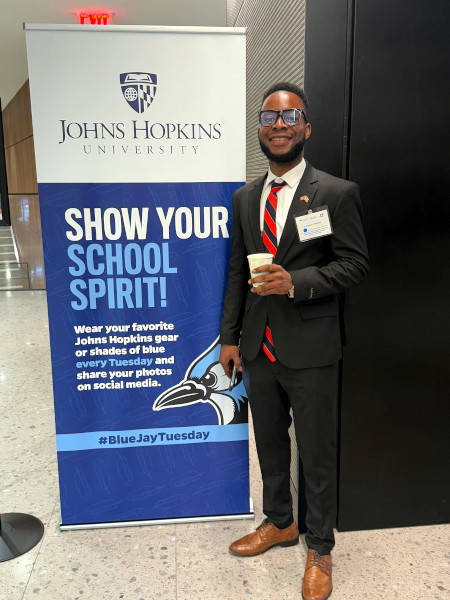Jutomue Doetein
GFMER Coordinator for Liberia

Jutomue Doetein
Founder & Executive Director – Youth ARISE 4 Development
jutomuedoetein@gmail.com
Jutomue Doetein, is an International Development Enthusiast and Human Rights Advocate, with more than 10 years’ experience. He has consistently championed the cause of women and girls' rights and empowered more than 25,000 children, adolescents and youths in Liberia. He further represents Liberia as the FP2030 Youth Focal Point. Furthermore, Jutomue has contributed enormously to the work of the United Nations, USAID, WHO and the Government of Liberia in promoting the rights of women and girls across Africa and continues to use his network and expertise to uplifting vulnerable populations. Based on his impact, Jutomue has gained several recognitions including the International Family Planning Trailblazer Award in 2022, the Mandela Washington Fellowship in 2024, the International Visitors Leadership Impact Award of the United States of America and many more. He dreams of a world where human rights are respected protected and development is a reality.
Areas of Interest
- International Development
- Family Planning
- SMART Advocacy
- Adolescent Sexual & Reproductive Health
- Leadership
- Youth Development and Empowerment
- Child Rights Advocacy
- Research & Communication
Membership & Affiliation
- UN Youth Advisory Panel
- UN Women Liberia Civil Society Advisory Board
- International Youth Coalition Sexual Reproductive Rights
- FP2030
- YALE
The Context of Liberia’s SRHR environment
Liberia has approximately 5.2 Million populations of which Adolescent and youth constitute approximately 64%. Females account for nearly 60% of the country's population. By the age of 18, a Liberian girl has a 50% chance of being married and a 31% chance that she is already a mother. More than 60 percent of the country's women have their first birth before age 20. Teenage pregnancy rate is 30.1% with high region specific rates, as revealed by Demographic Health Survey (LDHS 2019/2020). And the growing numbers of sexual and gender-based violence especially rape is also alarming. Currently in Liberia, adolescents and young people face major challenges that include risky behavior and sexual practices which results in high rates of maternal mortality and morbidity, unsafe abortion, unplanned pregnancies, misconception about family planning, sexually transmitted and reproductive tract infections including HIV/AIDS, cervical cancer, harmful practices to include FGM, early/forced marriage among others. Healthy adolescents and youth possess great potential to contribute to their families, communities and the nation both at present and in the future. However, there is a significant knowledge gap among adolescents and youth on sexual and reproductive health issues. Furthermore, the unmet need for Family planning among girls 15-19 years, is 47.2% and among women 20-24, is 35.8 %.
However, according to LDHS 19/2020, the country unmet need is 33.4%. While there are numerous factors contributing to these statistics, limited statistical evidence, personnel and services are compounded by limited capacity and technical skills among health providers to deliver quality SRH services and understanding of youth and negative social norms are barriers to addressing the SRH needs of adolescent and young people in Liberia. With these facts, Ministry of Health and its stakeholders committed to reduce teenage pregnancy among girls thus, increasing the CPR among adolescent from 24 percent to 39.7% percent by 2030. It is anticipated that adolescents birth rate will be reduced by 25 percent (from 177/1000 live births to 150/1000 live births), reduce adolescent pregnancy rate by 5 percent and increase in the number of Health facilities providing integrated adolescent-friendly health services by 10 percent.
Despite the challenges, Liberia has made progress in improving the health and wellbeing of children, adolescents, youths as well as women and girls.
Duties/Functions of the Liberia’s Geneva Foundation for Medical Education & Research Country Coordinator
- Coaching Liberian students and researchers, i.e., help the students to access the teaching material, learning methods. As the majority of student’s paper works (course assignments and research protocol) are based on the analysis of local situation in regards to sexual and reproductive health problems, the country coordinators can offer the appropriate assistance to the students.
- Ensure communication with the course organizers and students.
- Advertise course to various local training and research institutions.
- Recruit eligible candidates for the course.
- Create a network within the students from Liberia.
- Organize if possible some meetings with students from Liberia.
The below links are work done by Jutomue Doetein
- https://jutomuedoetei.blogspot.com/
- https://frontpageafricaonline.com/education/liberia-ten-youths-complete-youth-4-youth-smart-advocacy-workshop-in-monrovia/
- https://www.youth4disarmament.org/meet-jutomue-dotein?language_content_entity=en
- https://www.linkedin.com/in/jutomue-doetein-3b8597156/?original_referer=https%3A%2F%2Fwww%2Ebing%2Ecom%2F&originalSubdomain=lr
- https://web.facebook.com/people/Jutomue-Doetein/100005969747899/
- https://www.bing.com/videos/riverview/relatedvideo?&q=jutomue+doetein+facebook&&mid=1B95D2FFD0EE707ACE0B1B95D2FFD0EE707ACE0B&&FORM=VRDGAR
- Jutomue Doetein - ICFP (icfp2022.org)
- Jutomue — Youth Coalition
- Jutomue Doetein (2023) (whoglocal.com)
- Liberian Children Representative Forum Speaker Craves for Justice - allAfrica.com
- (3755) How Young people in Liberia are working to improve AYSRHR? - YouTube
- (3755) The Let Us Learn Program response to COVID-19- SHALOM Liberia - YouTube
GFMER Picture of the Week
- Teenage pregnancy prevention, Paynesville, Liberia - Jutomue Doetein - GFMER picture of the week
- Take Family Planning to prevent unwanted pregnancy, Paynesville, Liberia - Jutomue Doetein - GFMER picture of the week
- Kwatekeh Radio, the dedicated media institution in Liberia, Gbarnga, Liberia - Jutomue Doetein - GFMER picture of the week
- Maternal Health Club Launch, Margibi, Liberia - Jutomue Doetein - GFMER picture of the week
- Conference on Positive Masculinity, Dakar, Senegal - Jutomue Doetein - GFMER picture of the week
- To improved adolescent health and well-being, Paynesville, Liberia - Jutomue Doetein - GFMER picture of the week
- Youth Leadership development program, Monrovia, Liberia - Jutomue Doetein - GFMER picture of the week
- Certificate in SMART Advocacy, Accra, Ghana - Jutomue Doetein - GFMER picture of the week
- Habitat for Humanity, Baltimore, Maryland, USA - Jutomue Doetein - GFMER picture of the week
- Jutomue Doetein, GFMER Coordinator for Liberia - GFMER picture of the week